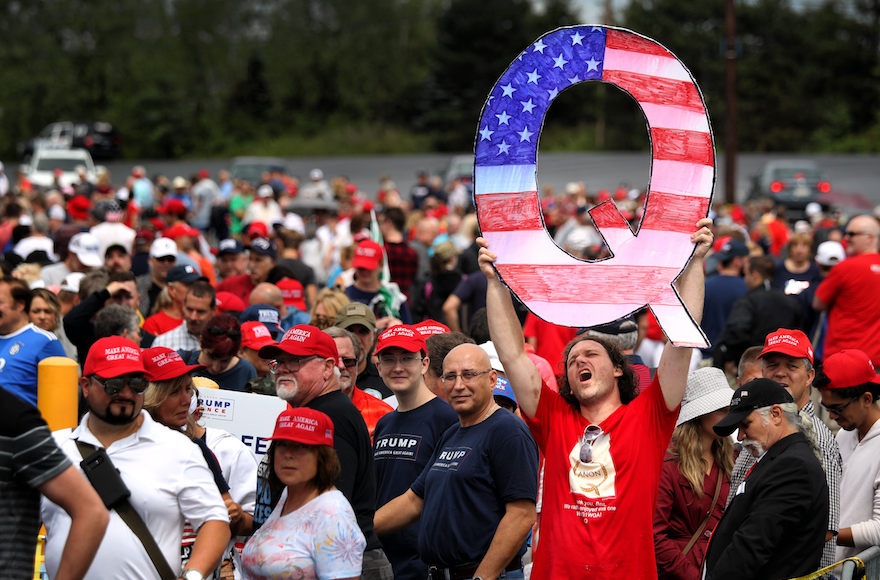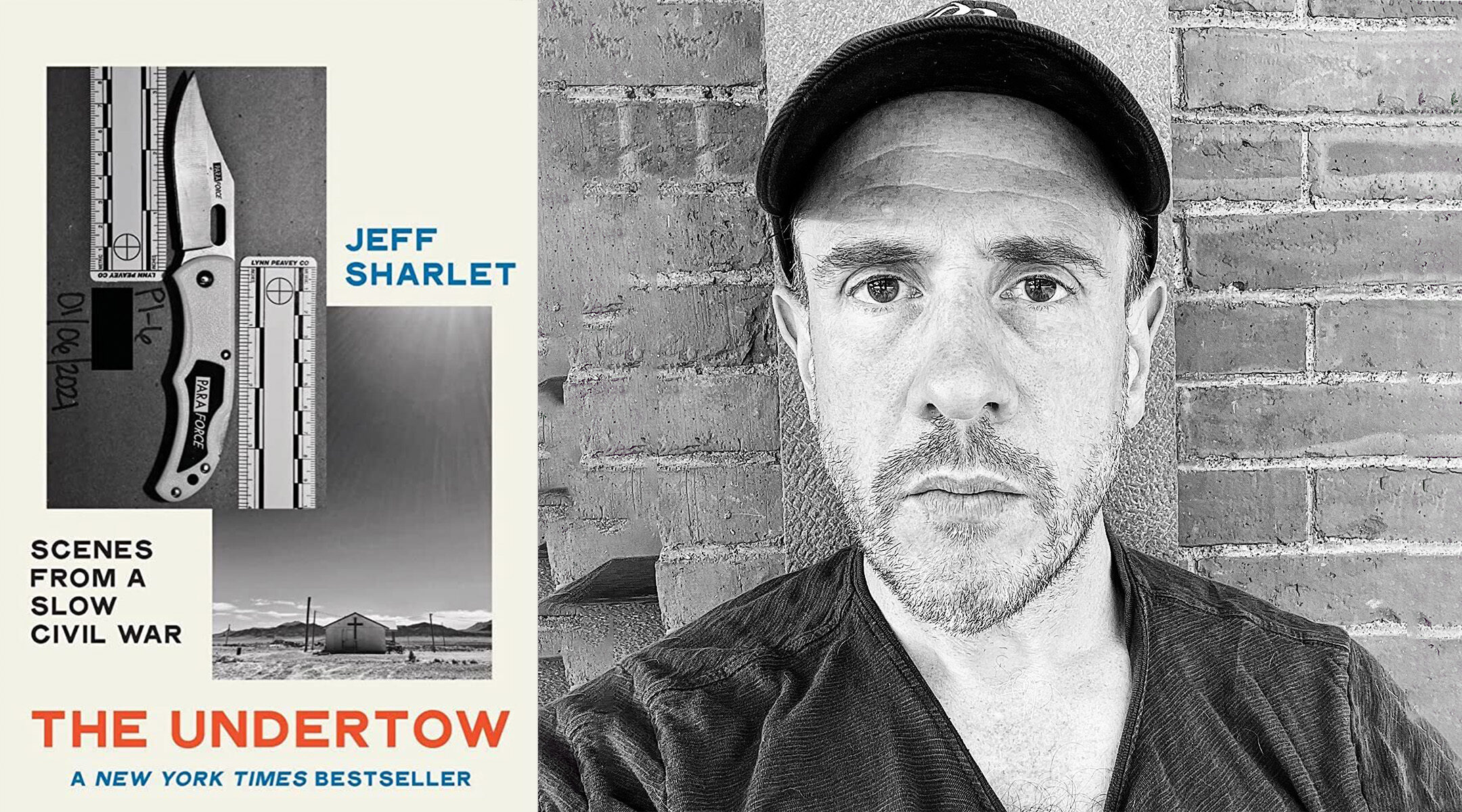(JTA) — Jeff Sharlet admits up front that his book about what he and others call the “Trumpocene” epoch is not objective.
“Transparent subjectivity is a virtue for this kind of reporting,” he said. “I am trying to understand the proliferation, which is very real, of fascist flags [across America]. I don’t like it when I see a movement [creating] fascist folk art.”
In “The Undertow: Scenes from a Slow Civil War,” the religion reporter and writing professor chronicles his recent journeys across America interviewing QAnon acolytes, Christian nationalists, proud misogynists, unrepentant January 6ers, armed militia men and strict anti-abortion activists — all still in thrall to Donald Trump.
It’s a familiar story of an America on the edge, but Sharlet adds the perspective of a journalist who has long covered religion. He was among the first to note that Trump rallies were less political events than religious revivals. And like many religions, he says, Trumpism is resistant to the kinds of “civil discourse” that many people propose as an antidote to polarization.
“We cannot fact check a myth, right?” Sharlet told me in a video interview from his home in Vermont. “It’s not going to work to say, ‘That’s not true.’”
I wanted to speak to Sharlet to discuss what he calls the “gospel of Trump” and how it differs from partisan politics as usual. And I wanted to know more about his own Jewish background and how that has informed his project.
Sharlet, a professor of writing at Dartmouth College, shapes his narrative largely around the story of Ashli Babbitt, the 35-year-old woman who was killed by a Capitol police officer during the Jan. 6 riot. He talks to those who lionize Babbitt, standing on porches under flags reading “F— Biden” and “No Surrender.” He describes the ways she has become a martyr on the far-right, part of a mythology that inverts what happened on that day.
Babbitt, he suggests, was a victim of the “undertow” of the book’s title: a sense of “grief and loss and mourning” that animated protesters like her. Trump spoke directly to this “erosion of white power, which was felt more severely down the socio-economic ladder,” Sharlet said. “Ashli Babbitt experiences it as a loss, but she can’t name the structural details – like the fact that there’s such a lack of banking regulation that she ends up with a loan that literally nobody can pay back.”
So she joined the mob charging the Capitol. “Unprocessed grief curdles into rage, rage that just sits there until along comes Trump,” said Sharlet. The result is a stew that he unhesitantly calls fascism, which he has defined as a right-wing cult of personality that takes pleasure in violence, disdains democracy and considers its opponents decadent.
Sharlet visits churches where the same rage is heard in the pulpit and where Trump is regarded as a prophet, leading outsiders to wonder how faithful Christians could embrace Trump despite his own lack of Christian values.
On the latter assertion, Sharlet notes that Trump does have Christian values, rooted in the teachings of his childhood pastor, Norman Vincent Peale. The author of “The Power of Positive Thinking” and a proponent of the “prosperity gospel,” Peale saw material wealth as a sign of divine providence, and “applied Christianity” as a way to achieve it.
“Politicians have long borrowed from religion the passion and the righteousness, but no other major modern figure [before Trump] had channeled the tension that makes Scripture endure, the desire, the wanting that gives rise to the closest analogue to Trumpism: the prosperity gospel, the American religion of winning,” he writes.
He also speaks to pastors and followers who would read Trump’s words “like Scripture”: “Every tweet, every misspelling, every typo, every strange capitalization — especially the capitalizations, said [one pastor] — had meaning.” Sharlet compares this to Gnosticism, the heretical Christian movement that believed in “a form of exclusive knowledge reserved for the faithful, a ‘truth’ you must have the eyes to see.”
Sharlet, whose earlier book “The Family” was about a fundamentalist ministry influential among the Washington political elite, said Christian nationalists who are drawn to dictators and flawed strongmen often cite the story of King David. The Old Testament king gains God’s favor despite killing his rival Uriah and, depending how you look at it, seducing or raping Uriah’s wife Bathsheba. “They’re very invested in this idea of chosenness, and King David is chosen,” said Sharlet.
All this mixing of religion, power and grievance made me wonder if liberal denominations have an adequate response to the stirrings on the far right.
“In the book I go to Glad Tidings, a church in Yuba City, California. And you walk in and there’s no crosses, because the pastor thinks the cross is a weak symbol of sacrifice. Instead the pulpit is made of swords,” said Sharlet. “That’s not to say that liberal religion is always weak — I mean, you have Reverend William Barber of the Forward Together Moral Movement in North Carolina, and liberal, religiously motivated activists who put themselves in the position of abortion clinic defenders.”
Rage also curdles into conspiracy theories. Many of his interviewees share the dark fantasies of QAnon, which imagines that the U.S. government is secretly controlled by Satan-worshiping pedophiles. As outlandish as these ideas sound, he said, “It’s hard to find Republicans now who have not absorbed some element of QAnon. People have never even heard of QAnon, but are worried about pedophiles in the schools, ‘grooming’ their children, apocalyptic visions of cities as battlegrounds of crime. This is straight out of QAnon.”

An audience member holds up a large “Q” sign, representing QAnon, a conspiracy theory group, while waiting in line to see President Donald J. Trump at his rally in Wilkes Barre, Pennsylvania, August 2, 2018. (Rick Loomis/Getty Images)
I ask Sharlet if his sample is selective, and if he only looked for and included people on the fringe to prove a point.
He countered by recalling his conversation with a woman who believed that the deadly Las Vegas shooting, by a high-stakes gambler who left 58 dead in 2017, was actually an attempt by ISIS on the life of Trump (who wasn’t in Vegas at the time). Sharlet was convinced the idea was hers alone. But a Google search told him that the theory was gaining traction on the far right, and that Tucker Carlson had invited a former congressman and retired brigadier general to talk about the “Vegas mystery” on his Fox News show.
Before his abrupt ouster last week, “Tucker Carlson had an audience of 4 million and a reach they say of more around 70 million – which is immeasurably greater than mine,” noted Sharlet. “So who is fringe? Me or Carlson?”
QAnon, he said, agrees with those who say QAnon draws on classic antisemitism. “It infuses QAnon,” he said. “You know, the blood of children being used to keep a secret elite, a secret cabal, directed by [Jewish financier and philanthropist George] Soros, and all the ‘globalist’ language. I was asked on a podcast what they mean by globalists and my answer was simple: the Jews. That’s what they mean, even when they don’t know that they mean it.”
Sharlet, the son of a Jewish dad and a Christian mom, describes himself as “a weird Jew, a secular Jew.”
“I was maybe more forcibly aware of this Jewishness when I grew up in a small town called Scotia, New York, and I got beat up for being a Jew,” he said.
After getting a degree in American history at Hampshire College, he went to work at the Yiddish Book Center in Amherst, Massachusetts, where he edited Pakn Treger, its literary magazine.
“I don’t like to say that my Jewishness is formed by antisemitism,” he said. “My Jewish education is working for the Yiddish Book Center and all the complications of Yiddish.”
He says the anger he encountered on the road has come to his small town in “a very blue area.” “The folks opposed to fascism still outnumber those who are coming to praise it,” he said. “But my kid goes to a school district that is facing legal threat from far-right people, including Jews, who think that it is too supportive of kids like my queer kid and they want the school to be reporting any instances of kids showing up not wearing the right gender clothes and so on.”
That experience has also shaped his response to those who ask if he is elevating a fringe through his writing.
“I have a queer nonbinary child who is being criminalized in about 20 states now. This is where I keep coming back to,” said Sharlet. “To the folks who say, ‘It’s just terrible what they’re doing to the trans kids,’ I want to say that they really haven’t learned from history. They think that fascism is like, ‘Well, we got our victim. We’re all done here now.’ No. It comes for everybody.”
If there is a solution to this unraveling, Sharlet says it will come from liberals who learn from their right-wing counterparts and create institutions that fight for their values.
“The prime example is higher education,” he said. “For a long time liberals want to insist that higher education is neutral.” And while the left is insisting on neutrality, the right is creating colleges — Regent University in Virginia Beach, the evangelical Liberty University, Oral Roberts University, Hillsdale College in southern Michigan — dedicated to its ideas. In Florida, Gov. Ron DeSantis is diverting state funding to transform a small liberal arts college, New College of Florida, into a conservative-leaning school.
“We have to build out cultural institutions and we have to recognize and own up to the fact that colleges are places of values,” he said. “They do not sit with fascism. So own that space, defend that space, be proud of that space. I think every synagogue in America whether it wants to accept this or not and even some of the politically conservative ones have to ask, which side are you on? Neutrality isn’t an option. As Jews especially, we don’t have a choice.”
JTA has documented Jewish history in real-time for over a century. Keep our journalism strong by joining us in supporting independent, award-winning reporting.







